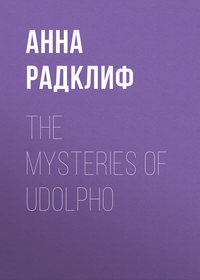 полная версия
полная версияA Sicilian Romance
On the following day Emilia and Julia dined with the marquis. He was gloomy and silent; their efforts to amuse him seemed to excite displeasure rather than kindness; and when the repast was concluded, he withdrew to his own apartment, leaving his daughters in a state of sorrow and surprise.
Vincent was to be interred, according to his own desire, in the church belonging to the convent of St Nicholas. One of the servants, after receiving some necessary orders concerning the funeral, ventured to inform the marquis of the appearance of the lights in the south tower. He mentioned the superstitious reports that prevailed amongst the household, and complained that the servants would not cross the courts after it was dark. 'And who is he that has commissioned you with this story?' said the marquis, in a tone of displeasure; 'are the weak and ridiculous fancies of women and servants to be obtruded upon my notice? Away—appear no more before me, till you have learned to speak what it is proper for me to hear.' Robert withdrew abashed, and it was some time before any person ventured to renew the subject with the marquis.
The majority of young Ferdinand now drew near, and the marquis determined to celebrate the occasion with festive magnificence at the castle of Mazzini. He, therefore, summoned the marchioness and his son from Naples, and very splendid preparations were ordered to be made. Emilia and Julia dreaded the arrival of the marchioness, whose influence they had long been sensible of, and from whose presence they anticipated a painful restraint. Beneath the gentle guidance of Madame de Menon, their hours had passed in happy tranquillity, for they were ignorant alike of the sorrows and the pleasures of the world. Those did not oppress, and these did not inflame them. Engaged in the pursuits of knowledge, and in the attainment of elegant accomplishments, their moments flew lightly away, and the flight of time was marked only by improvement. In madame was united the tenderness of the mother, with the sympathy of a friend; and they loved her with a warm and inviolable affection.
The purposed visit of their brother, whom they had not seen for several years, gave them great pleasure. Although their minds retained no very distinct remembrance of him, they looked forward with eager and delightful expectation to his virtues and his talents; and hoped to find in his company, a consolation for the uneasiness which the presence of the marchioness would excite. Neither did Julia contemplate with indifference the approaching festival. A new scene was now opening to her, which her young imagination painted in the warm and glowing colours of delight. The near approach of pleasure frequently awakens the heart to emotions, which would fail to be excited by a more remote and abstracted observance. Julia, who, in the distance, had considered the splendid gaieties of life with tranquillity, now lingered with impatient hope through the moments which withheld her from their enjoyments. Emilia, whose feelings were less lively, and whose imagination was less powerful, beheld the approaching festival with calm consideration, and almost regretted the interruption of those tranquil pleasures, which she knew to be more congenial with her powers and disposition.
In a few days the marchioness arrived at the castle. She was followed by a numerous retinue, and accompanied by Ferdinand, and several of the Italian noblesse, whom pleasure attracted to her train. Her entrance was proclaimed by the sound of music, and those gates which had long rusted on their hinges, were thrown open to receive her. The courts and halls, whose aspect so lately expressed only gloom and desolation, now shone with sudden splendour, and echoed the sounds of gaiety and gladness. Julia surveyed the scene from an obscure window; and as the triumphal strains filled the air, her breast throbbed; her heart beat quick with joy, and she lost her apprehensions from the marchioness in a sort of wild delight hitherto unknown to her. The arrival of the marchioness seemed indeed the signal of universal and unlimited pleasure. When the marquis came out to receive her, the gloom that lately clouded his countenance, broke away in smiles of welcome, which the whole company appeared to consider as invitations to joy.
The tranquil heart of Emilia was not proof against a scene so alluring, and she sighed at the prospect, yet scarcely knew why. Julia pointed out to her sister, the graceful figure of a young man who followed the marchioness, and she expressed her wishes that he might be her brother. From the contemplation of the scene before them, they were summoned to meet the marchioness. Julia trembled with apprehension, and for a few moments wished the castle was in its former state. As they advanced through the saloon, in which they were presented, Julia was covered with blushes; but Emilia, tho' equally timid, preserved her graceful dignity. The marchioness received them with a mingled smile of condescension and politeness, and immediately the whole attention of the company was attracted by their elegance and beauty. The eager eyes of Julia sought in vain to discover her brother, of whose features she had no recollection in those of any of the persons then present. At length her father presented him, and she perceived, with a sigh of regret, that he was not the youth she had observed from the window. He advanced with a very engaging air, and she met him with an unfeigned welcome. His figure was tall and majestic; he had a very noble and spirited carriage; and his countenance expressed at once sweetness and dignity. Supper was served in the east hall, and the tables were spread with a profusion of delicacies. A band of music played during the repast, and the evening concluded with a concert in the saloon.
CHAPTER II
The day of the festival, so long and so impatiently looked for by Julia, was now arrived. All the neighbouring nobility were invited, and the gates of the castle were thrown open for a general rejoicing. A magnificent entertainment, consisting of the most luxurious and expensive dishes, was served in the halls. Soft music floated along the vaulted roofs, the walls were hung with decorations, and it seemed as if the hand of a magician had suddenly metamorphosed this once gloomy fabric into the palace of a fairy. The marquis, notwithstanding the gaiety of the scene, frequently appeared abstracted from its enjoyments, and in spite of all his efforts at cheerfulness, the melancholy of his heart was visible in his countenance.
In the evening there was a grand ball: the marchioness, who was still distinguished for her beauty, and for the winning elegance of her manners, appeared in the most splendid attire. Her hair was ornamented with a profusion of jewels, but was so disposed as to give an air rather of voluptuousness than of grace, to her figure. Although conscious of her charms, she beheld the beauty of Emilia and Julia with a jealous eye, and was compelled secretly to acknowledge, that the simple elegance with which they were adorned, was more enchanting than all the studied artifice of splendid decoration. They were dressed alike in light Sicilian habits, and the beautiful luxuriance of their flowing hair was restrained only by bandellets of pearl. The ball was opened by Ferdinand and the lady Matilda Constanza. Emilia danced with the young Marquis della Fazelli, and acquitted herself with the ease and dignity so natural to her. Julia experienced a various emotion of pleasure and fear when the Count de Vereza, in whom she recollected the cavalier she had observed from the window, led her forth. The grace of her step, and the elegant symmetry of her figure, raised in the assembly a gentle murmur of applause, and the soft blush which now stole over her cheek, gave an additional charm to her appearance. But when the music changed, and she danced to the soft Sicilian measure, the airy grace of her movement, and the unaffected tenderness of her air, sunk attention into silence, which continued for some time after the dance had ceased. The marchioness observed the general admiration with seeming pleasure, and secret uneasiness. She had suffered a very painful solicitude, when the Count de Vereza selected her for his partner in the dance, and she pursued him through the evening with an eye of jealous scrutiny. Her bosom, which before glowed only with love, was now torn by the agitation of other passions more violent and destructive. Her thoughts were restless, her mind wandered from the scene before her, and it required all her address to preserve an apparent ease. She saw, or fancied she saw, an impassioned air in the count, when he addressed himself to Julia, that corroded her heart with jealous fury.
At twelve the gates of the castle were thrown open, and the company quitted it for the woods, which were splendidly illuminated. Arcades of light lined the long vistas, which were terminated by pyramids of lamps that presented to the eye one bright column of flame. At irregular distances buildings were erected, hung with variegated lamps, disposed in the gayest and most fantastic forms. Collations were spread under the trees; and music, touched by unseen hands, breathed around. The musicians were placed in the most obscure and embowered spots, so as to elude the eye and strike the imagination. The scene appeared enchanting. Nothing met the eye but beauty and romantic splendour; the ear received no sounds but those of mirth and melody. The younger part of the company formed themselves into groups, which at intervals glanced through the woods, and were again unseen. Julia seemed the magic queen of the place. Her heart dilated with pleasure, and diffused over her features an expression of pure and complacent delight. A generous, frank, and exalted sentiment sparkled in her eyes, and animated her manner. Her bosom glowed with benevolent affections; and she seemed anxious to impart to all around her, a happiness as unmixed as that she experienced. Wherever she moved, admiration followed her steps. Ferdinand was as gay as the scene around him. Emilia was pleased; and the marquis seemed to have left his melancholy in the castle. The marchioness alone was wretched. She supped with a select party, in a pavilion on the sea-shore, which was fitted up with peculiar elegance. It was hung with white silk, drawn up in festoons, and richly fringed with gold. The sofas were of the same materials, and alternate wreaths of lamps and of roses entwined the columns. A row of small lamps placed about the cornice, formed an edge of light round the roof which, with the other numerous lights, was reflected in a blaze of splendour from the large mirrors that adorned the room. The Count Muriani was of the party;—he complimented the marchioness on the beauty of her daughters; and after lamenting with gaiety the captives which their charms would enthral, he mentioned the Count de Vereza. 'He is certainly of all others the man most deserving the lady Julia. As they danced, I thought they exhibited a perfect model of the beauty of either sex; and if I mistake not, they are inspired with a mutual admiration.' The marchioness, endeavouring to conceal her uneasiness, said, 'Yes, my lord, I allow the count all the merit you adjudge him, but from the little I have seen of his disposition, he is too volatile for a serious attachment.' At that instant the count entered the pavilion: 'Ah,' said Muriani, laughingly, 'you was the subject of our conversation, and seem to be come in good time to receive the honors allotted you. I was interceding with the marchioness for her interest in your favor, with the lady Julia; but she absolutely refuses it; and though she allows you merit, alleges, that you are by nature fickle and inconstant. What say you—would not the beauty of lady Julia bind your unsteady heart?'.
'I know not how I have deserved that character of the marchioness,' said the count with a smile, 'but that heart must be either fickle or insensible in an uncommon degree, which can boast of freedom in the presence of lady Julia.' The marchioness, mortified by the whole conversation, now felt the full force of Vereza's reply, which she imagined he pointed with particular emphasis.
The entertainment concluded with a grand firework, which was exhibited on the margin of the sea, and the company did not part till the dawn of morning. Julia retired from the scene with regret. She was enchanted with the new world that was now exhibited to her, and she was not cool enough to distinguish the vivid glow of imagination from the colours of real bliss. The pleasure she now felt she believed would always be renewed, and in an equal degree, by the objects which first excited it. The weakness of humanity is never willingly perceived by young minds. It is painful to know, that we are operated upon by objects whose impressions are variable as they are indefinable—and that what yesterday affected us strongly, is to-day but imperfectly felt, and to-morrow perhaps shall be disregarded. When at length this unwelcome truth is received into the mind, we at first reject, with disgust, every appearance of good, we disdain to partake of a happiness which we cannot always command, and we not unfrequently sink into a temporary despair. Wisdom or accident, at length, recal us from our error, and offers to us some object capable of producing a pleasing, yet lasting effect, which effect, therefore, we call happiness. Happiness has this essential difference from what is commonly called pleasure, that virtue forms its basis, and virtue being the offspring of reason, may be expected to produce uniformity of effect.
The passions which had hitherto lain concealed in Julia's heart, touched by circumstance, dilated to its power, and afforded her a slight experience of the pain and delight which flow from their influence. The beauty and accomplishments of Vereza raised in her a new and various emotion, which reflection made her fear to encourage, but which was too pleasing to be wholly resisted. Tremblingly alive to a sense of delight, and unchilled by disappointment, the young heart welcomes every feeling, not simply painful, with a romantic expectation that it will expand into bliss.
Julia sought with eager anxiety to discover the sentiments of Vereza towards her; she revolved each circumstance of the day, but they afforded her little satisfaction; they reflected only a glimmering and uncertain light, which instead of guiding, served only to perplex her. Now she remembered some instance of particular attention, and then some mark of apparent indifference. She compared his conduct with that of the other young noblesse; and thought each appeared equally desirous of the favor of every lady present. All the ladies, however, appeared to her to court the admiration of Vereza, and she trembled lest he should be too sensible of the distinction. She drew from these reflections no positive inference; and though distrust rendered pain the predominate sensation, it was so exquisitely interwoven with delight, that she could not wish it exchanged for her former ease. Thoughtful and restless, sleep fled from her eyes, and she longed with impatience for the morning, which should again present Vereza, and enable her to pursue the enquiry. She rose early, and adorned herself with unusual care. In her favorite closet she awaited the hour of breakfast, and endeavoured to read, but her thoughts wandered from the subject. Her lute and favorite airs lost half their power to please; the day seemed to stand still—she became melancholy, and thought the breakfast-hour would never arrive. At length the clock struck the signal, the sound vibrated on every nerve, and trembling she quitted the closet for her sister's apartment. Love taught her disguise. Till then Emilia had shared all her thoughts; they now descended to the breakfast-room in silence, and Julia almost feared to meet her eye. In the breakfast-room they were alone. Julia found it impossible to support a conversation with Emilia, whose observations interrupting the course of her thoughts, became uninteresting and tiresome. She was therefore about to retire to her closet, when the marquis entered. His air was haughty, and his look severe. He coldly saluted his daughters, and they had scarcely time to reply to his general enquiries, when the marchioness entered, and the company soon after assembled. Julia, who had awaited with so painful an impatience for the moment which should present Vereza to her sight, now sighed that it was arrived. She scarcely dared to lift her timid eyes from the ground, and when by accident they met his, a soft tremour seized her; and apprehension lest he should discover her sentiments, served only to render her confusion conspicuous. At length, a glance from the marchioness recalled her bewildered thoughts; and other fears superseding those of love, her mind, by degrees, recovered its dignity. She could distinguish in the behaviour of Vereza no symptoms of particular admiration, and she resolved to conduct herself towards him with the most scrupulous care.
This day, like the preceding one, was devoted to joy. In the evening there was a concert, which was chiefly performed by the nobility. Ferdinand played the violoncello, Vereza the German flute, and Julia the piana-forte, which she touched with a delicacy and execution that engaged every auditor. The confusion of Julia may be easily imagined, when Ferdinand, selecting a beautiful duet, desired Vereza would accompany his sister. The pride of conscious excellence, however, quickly overcame her timidity, and enabled her to exert all her powers. The air was simple and pathetic, and she gave it those charms of expression so peculiarly her own. She struck the chords of her piana-forte in beautiful accompaniment, and towards the close of the second stanza, her voice resting on one note, swelled into a tone so exquisite, and from thence descended to a few simple notes, which she touched with such impassioned tenderness that every eye wept to the sounds. The breath of the flute trembled, and Hippolitus entranced, forgot to play. A pause of silence ensued at the conclusion of the piece, and continued till a general sigh seemed to awaken the audience from their enchantment. Amid the general applause, Hippolitus was silent. Julia observed his behaviour, and gently raising her eyes to his, there read the sentiments which she had inspired. An exquisite emotion thrilled her heart, and she experienced one of those rare moments which illuminate life with a ray of bliss, by which the darkness of its general shade is contrasted. Care, doubt, every disagreeable sensation vanished, and for the remainder of the evening she was conscious only of delight. A timid respect marked the manner of Hippolitus, more flattering to Julia than the most ardent professions. The evening concluded with a ball, and Julia was again the partner of the count.
When the ball broke up, she retired to her apartment, but not to sleep. Joy is as restless as anxiety or sorrow. She seemed to have entered upon a new state of existence;—those fine springs of affection which had hitherto lain concealed, were now touched, and yielded to her a happiness more exalted than any her imagination had ever painted. She reflected on the tranquillity of her past life, and comparing it with the emotions of the present hour, exulted in the difference. All her former pleasures now appeared insipid; she wondered that they ever had power to affect her, and that she had endured with content the dull uniformity to which she had been condemned. It was now only that she appeared to live. Absorbed in the single idea of being beloved, her imagination soared into the regions of romantic bliss, and bore her high above the possibility of evil. Since she was beloved by Hippolitus, she could only be happy.
From this state of entranced delight, she was awakened by the sound of music immediately under her window. It was a lute touched by a masterly hand. After a wild and melancholy symphony, a voice of more than magic expression swelled into an air so pathetic and tender, that it seemed to breathe the very soul of love. The chords of the lute were struck in low and sweet accompaniment. Julia listened, and distinguished the following words;
SONNETStill is the night-breeze!—not a lonely sound Steals through the silence of this dreary hour;O'er these high battlements Sleep reigns profound, And sheds on all, his sweet oblivious power.On all but me—I vainly ask his dews To steep in short forgetfulness my cares.Th' affrighted god still flies when Love pursues, Still—still denies the wretched lover's prayers.An interval of silence followed, and the air was repeated; after which the music was heard no more. If before Julia believed that she was loved by Hippolitus, she was now confirmed in the sweet reality. But sleep at length fell upon her senses, and the airy forms of ideal bliss no longer fleeted before her imagination. Morning came, and she arose light and refreshed. How different were her present sensations from those of the preceding day. Her anxiety had now evaporated in joy, and she experienced that airy dance of spirits which accumulates delight from every object; and with a power like the touch of enchantment, can transform a gloomy desert into a smiling Eden. She flew to the breakfast-room, scarcely conscious of motion; but, as she entered it, a soft confusion overcame her; she blushed, and almost feared to meet the eyes of Vereza. She was presently relieved, however, for the Count was not there. The company assembled—Julia watched the entrance of every person with painful anxiety, but he for whom she looked did not appear. Surprised and uneasy, she fixed her eyes on the door, and whenever it opened, her heart beat with an expectation which was as often checked by disappointment. In spite of all her efforts, her vivacity sunk into languor, and she then perceived that love may produce other sensations than those of delight. She found it possible to be unhappy, though loved by Hippolitus; and acknowledged with a sigh of regret, which was yet new to her, how tremblingly her peace depended upon him. He neither appeared nor was mentioned at breakfast; but though delicacy prevented her enquiring after him, conversation soon became irksome to her, and she retired to the apartment of Madame de Menon. There she employed herself in painting, and endeavoured to beguile the time till the hour of dinner, when she hoped to see Hippolitus. Madame was, as usual, friendly and cheerful, but she perceived a reserve in the conduct of Julia, and penetrated without difficulty into its cause. She was, however, ignorant of the object of her pupil's admiration. The hour so eagerly desired by Julia at length arrived, and with a palpitating heart she entered the hall. The Count was not there, and in the course of conversation, she learned that he had that morning sailed for Naples. The scene which so lately appeared enchanting to her eyes, now changed its hue; and in the midst of society, and surrounded by gaiety, she was solitary and dejected. She accused herself of having suffered her wishes to mislead her judgment; and the present conduct of Hippolitus convinced her, that she had mistaken admiration for a sentiment more tender. She believed, too, that the musician who had addressed her in his sonnet, was not the Count; and thus at once was dissolved all the ideal fabric of her happiness. How short a period often reverses the character of our sentiments, rendering that which yesterday we despised, to-day desirable. The tranquil state which she had so lately delighted to quit, she now reflected upon with regret. She had, however, the consolation of believing that her sentiments towards the Count were unknown, and the sweet consciousness that her conduct had been governed by a nice sense of propriety.
The public rejoicings at the castle closed with the week; but the gay spirit of the marchioness forbade a return to tranquillity; and she substituted diversions more private, but in splendour scarcely inferior to the preceding ones. She had observed the behaviour of Hippolitus on the night of the concert with chagrin, and his departure with sorrow; yet, disdaining to perpetuate misfortune by reflection, she sought to lose the sense of disappointment in the hurry of dissipation. But her efforts to erase him from her remembrance were ineffectual. Unaccustomed to oppose the bent of her inclinations, they now maintained unbounded sway; and she found too late, that in order to have a due command of our passions, it is necessary to subject them to early obedience. Passion, in its undue influence, produces weakness as well as injustice. The pain which now recoiled upon her heart from disappointment, she had not strength of mind to endure, and she sought relief from its pressure in afflicting the innocent. Julia, whose beauty she imagined had captivated the count, and confirmed him in indifference towards herself, she incessantly tormented by the exercise of those various and splenetic little arts which elude the eye of the common observer, and are only to be known by those who have felt them. Arts, which individually are inconsiderable, but in the aggregate amount to a cruel and decisive effect.









